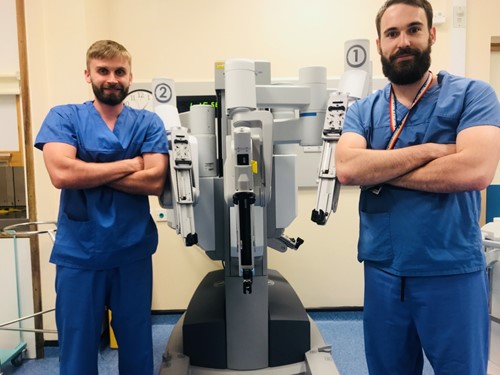Meet Operating Department Practitioners (ODP) Matt and Tom
An Operating Department Practitioner (ODP) is a vital part of the operating theatre team, to provide a high standard of care to patients of all ages, at every stage of their operation.
So we took the time to find out more about this role by speaking to Matthew Kobylarz (pictured right) and Tom Sherratt (pictured left) that get to work with our state-of-the-art robotic surgeon.

My name is Matthew Kobylarz, I am a Surgical Care Practitioner’s (SCP) for General Surgery at the University Hospital North Midlands Trust. I primarily work within the Colorectal Surgery department as its dedicated robotic assistant, but I can be found working for any of the General Surgical specialities as well as helping in our emergency theatres when needed.
I started my career at the UHNM on the same day as Tom (pictured with me above) in 2005 in the Sterile Services department. We both worked as service operatives who helped to prepare the surgical equipment for use. I left for theatres in 2008 when I started my training as an Operating department practitioner (ODP) at Keele University. I qualified in 2010 and worked at both the Royal Infirmary and City General as an Anaesthetic Practitioner.
The role of the ODP isn’t very well known outside of the theatres but it can be quite a diverse role. ODPs can be typically found providing peri-operative care in the surgical department in the same roles that have traditionally been fulfilled by nurses. The training teaches you the knowledge required to work within the three phases of surgery; the anaesthetic phase, the surgical and the post-anaesthetic care phases. I worked in anaesthetics for a year before moving to a full time surgical scrub position for General Surgery where I was promoted to a Senior ODP.
In 2015 the General Surgery department at UHNM was expanding to accommodate its increasing number of surgical patients. The Trust already employed a small number of assistants who helped within the Cardiac and Orthopaedic departments, and it was something that I became interested in. The consultants I worked with were keen to support my training so I returned to university to complete a couple of short modules that would allow me to directly assist surgeons as a Surgical First Assistant (SFA).
It wasn’t long after I began my training that the Urology department purchased the Trust’s first Da Vinci Surgical Robot. The new machine provided a need for a dedicated robotic assistant in Urology and Tom and I jumped at the chance to work with the new machine. Colorectal surgery soon followed and I become the full time surgical assistant for colorectal surgery. The robot is a complex machine that would require further training to use so to keep pace with the surgical department’s requirement for more advanced surgical practitioners and satisfy the latest professional guidelines we decided to undertake a Master’s degree in Surgical Care Practice at Edge Hill University in 2017. We graduated at the end of 2019 and both continue to work for our respective specialities.
The Trust continues to support both robotic programmes and have expanded the service by purchasing the latest robot that Intuitive Surgery currently provides; The Da Vinci Xi.
The role is traditionally performed by Junior doctors or surgeons in training. It’s unique that as a trained ODP we can directly help surgeons to perform complex surgical procedures. When we work during robotic procedures, the surgeon will sit separate from the patient at the controls of the robotic equipment. The consultants have given us a lot of responsibility to independently prepare the patient and help them with the surgery.
They have trained us to safely perform tasks that they would usually reserve for their Registrars and part of our role is helping to develop upcoming surgical trainees alongside the consultants. Due to the rotating nature of surgical training, the surgeons enjoy having a familiar face who understands their requirements and preferences to complete their surgeries.
The long surgical hours can be daunting but a good breakfast and seeing the end results for patients always makes the job very rewarding. As an Surgical Care Practitioner’s we will see our patients pre and post-operatively and be a part of their on-going recovery. We get to work closer with patients and other members of the wider surgical team than we typically would as an ODP.
Working with the latest technology is definitely a great perk to the job, we attend surgical conferences and work closely with various surgical companies so that we can continue to improve our services. This means we get to meet lots of people from all walks of life and our roles are constantly changing to keep pace with advances in surgery.
The trust has fully supported my career progression, especially with some of the financial aspects of going to back to university. It was a challenge to re-engage with the academic side after a few years away from education and me and Tom spent many hours up and down the M6 wondering if it was all going to be worth it!
We’ve both had the good fortune to network with people as far as New York and Tokyo where we have learnt new surgical skills with our consultants to enhance the patient care here at the Royal Stoke. Going abroad with work is always memorable!
FOOTBALL! Me and Tom both play for the same Sunday league football team, although Tom is currently focusing his efforts on training for an Ironman in Italy at the end of this year.